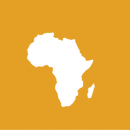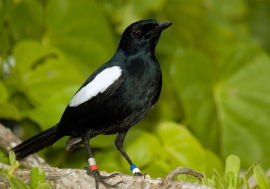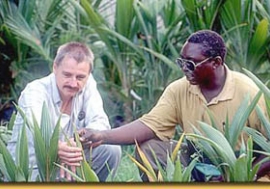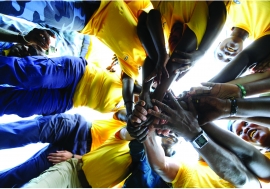What the World Summit means for Africa
What the World Summit means for Africa
Since early in the year, many in Africa had been looking forward to the 2005 World Summit in New York, anticipating decisions that could greatly influence their continent’s future. The 14-16 September gathering lived up to some of those expectations. Yet many of the 43 participating African leaders went back home with a sense that much more should have been achieved.
Africa recognizes that it bears the primary responsibility for its own development, Nigerian President Olusegun Obasanjo told the summit on behalf of the African Union (AU). But, he added, it also “needs genuine partnership in order to overcome its numerous challenges and problems.” He welcomed the pledges already made to help Africa, and then reminded the world’s leaders “to fulfill their commitments.”
 UN Secretary-General Kofi Annan and Nigerian President Olusegun Obasanjo discuss key issues at the African Union meeting in July.
UN Secretary-General Kofi Annan and Nigerian President Olusegun Obasanjo discuss key issues at the African Union meeting in July.Those comments echoed UN Secretary-General Kofi Annan’s address to an AU summit in Libya two months earlier. Noting the recent pledges of the Group of Eight (G-8) industrialized countries to double aid to Africa and to cancel the multilateral debt of more than a dozen African countries (see page 8), he affirmed that Africa would be able to achieve the Millennium Development Goals (MDGs) “if the long-promised global partnership is truly mobilized. No new promises are needed to make this happen — just a follow-through on existing ones.”
Promises ‘locked in’
During the intense negotiations that preceded the World Summit, some delegations objected to aspects of the sweeping reform proposals that Mr. Annan had advanced. Discussions on overhauling the Security Council, for example, were postponed. The US initially suggested, among other points, that references to the MDGs and to specific targets for aid increases be eliminated from the summit’s “outcome document.”
But in the end, those elements were left in. The document expressed a strong and unambiguous commitment by all governments to achieve the MDGs by 2015. Donor pledges to increase aid worldwide by an estimated $50 bn annually by 2010 were welcomed. “By your agreeing on the outcome document,” Mr. Annan told the delegates at the summit opening, “these achievements will be locked in.”
Other decisions also will have important implications for Africa. The summit agreed to establish a new standing police capacity for UN peacekeeping operations in Africa and elsewhere and to create a new Peacebuilding Commission to help countries undergoing the difficult transition from war to peace. The UN’s humanitarian emergency fund will be strengthened so that relief aid arrives more quickly and reliably when famine or other disasters occur.
The document also included a clear and unambiguous acceptance by all governments of an international responsibility to protect populations from genocide, war crimes, ethnic cleansing and crimes against humanity. When peaceful means fail to prevent such acts, governments have pledged “to take collective action, in a timely and decisive manner,” to authorize forceful measures by the Security Council.
Spotlight on Africa
The summit document highlighted Africa’s specific needs. It welcomed the “substantial progress” African countries have made in fulfilling their own commitments and emphasized the need to continue implementation of the New Partnership for Africa’s Development (NEPAD). It welcomed the decisions by the G-8 and the European Union to increase aid to Africa by an additional $25 bn per year by 2010. The assembled heads of state also agreed to:
- strengthen cooperation with NEPAD
- support African efforts to ensure that all children have access to basic health care and to quality free and compulsory primary education by 2015
- support the establishment of an “international infrastructure consortium” involving the AU, the World Bank and the African Development Bank, with NEPAD as the main framework, to facilitate public and private infrastructure investment
- promote comprehensive debt relief, through the G-8 proposal for 100 per cent cancellation of multilateral debt for heavily indebted poor countries (HIPCs), as well as significant debt relief for other heavily indebted countries “on a case-by-case basis, where appropriate”
- initiate programmes to increase African countries’ trade capacities and help them restructure, diversify and strengthen the competitiveness of their commodity sectors
- support African efforts to increase agricultural productivity, as outlined in NEPAD’s Comprehensive Africa Agriculture Development Programme
- back initiatives by the AU and African sub-regional organizations to prevent, mediate and resolve conflicts, with assistance from the UN
- work towards achieving a goal of universal access to HIV/AIDS treatment in African countries by 2010.
The world’s governments declared: “We reaffirm our commitment to address the special needs of Africa, which is the only continent not on track to meet any of the goals of the Millennium Declaration by 2015, to enable it to enter the mainstream of the world economy.”
















